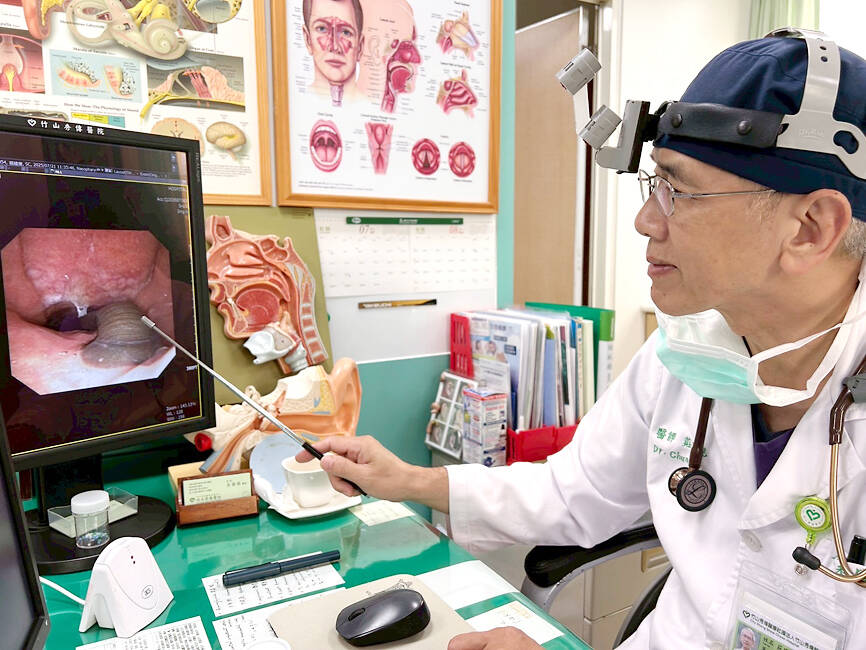A leech lived in a man’s nasopharynx, the upper part of the throat, for more than a month, presumably gaining entry after he washed his face in a stream, a doctor said earlier this month.
The 56-year-old man, surnamed Tsai (蔡), went to see a doctor at the Chu Shang Show Chwan Hospital in Nantou County due to a strange sensation in his throat.
During the oral checkup, Tsai’s doctor saw a black tail wiggling at the back of his mouth, which an endoscopy revealed to be a 4cm-long leech attached to his left nasal cavity.

Photo courtesy of Chu Shang Show Chwan Hospital
The leech was estimated to have been living in Tsai’s nasopharynx for one to two months.
After the application of anesthetics at the site, the leech shrank, fell off and was eventually expelled in a sneeze.
Hospital superintendent and otolaryngologist Chuang Pi-kun (莊碧焜) said that when Tsai washed his face in a stream, the leech likely wormed into his body through his nose, mouth or eyes, before attaching itself to the mucosa to suck blood.
Leeches live in freshwater environments, such as streams, ponds or paddy fields, he said.
The hospital had previously treated three other leech-attachment cases, all in in the nasal cavities, Chuang said.
However, Tsai was the hospital’s first case of someone who had a leech attached the soft palate in the nasopharynx — which is between the nasal cavities and the throat — showing that leeches attach to more areas than previously thought, he said.
People with a leech usually have symptoms such as nasal obstruction, nosebleeds or itchy nose, as well as a violent cough or a hoarse voice, Chuang said.
The condition can be as mild as experiencing discomfort or bleeding, or as severe and life-threatening as obstructing airways, he added.
Leeches’ saliva has anesthetic agents that often make people unable to feel the leech until it has grown bigger or their symptoms get more severe, Chuang said.
People who suspect leech attachment must not try to pull it or dig it out, in case the leech goes deeper or splits with its residue left inside the body, which can cause infection, he said.

The first global hotel Keys Selection by the Michelin Guide includes four hotels in Taiwan, Michelin announced yesterday. All four received the “Michelin One Key,” indicating guests are to experience a “very special stay” at any of the locations as the establishments are “a true gem with personality. Service always goes the extra mile, and the hotel provides much more than others in its price range.” Of the four hotels, three are located in Taipei and one in Taichung. In Taipei, the One Key accolades were awarded to the Capella Taipei, Kimpton Da An Taipei and Mandarin Oriental Taipei. Capella Taipei was described by

EVA Airways today confirmed the death of a flight attendant on Saturday upon their return to Taiwan and said an internal investigation has been launched, as criticism mounted over a social media post accusing the airline of failing to offer sufficient employee protections. According to the post, the flight attendant complained of feeling sick on board a flight, but was unable to take sick leave or access medical care. The crew member allegedly did not receive assistance from the chief purser, who failed to heed their requests for medical attention or call an ambulance once the flight landed, the post said. As sick

Minister of Economic Affairs Kung Ming-hsin (龔明鑫) yesterday said that private-sector refiners are willing to stop buying Russian naphtha should the EU ask them to, after a group of non-governmental organizations, including the Centre for Research on Energy and Clean Air (CREA), criticized the nation’s continued business with the country. While Taiwan joined the US and its Western allies in putting broad sanctions on Russia after it invaded Ukraine in 2022, it did not explicitly ban imports of naphtha, a major hard-currency earner for Russia. While state-owned firms stopped importing Russian oil in 2023, there is no restriction on private companies to

INDUSTRY: Beijing’s latest export measures go beyond targeting the US and would likely affect any country that uses Chinese rare earths or related tech, an academic said Taiwanese industries could face significant disruption from China’s newly tightened export controls on rare earth elements, as much of Taiwan’s supply indirectly depends on Chinese materials processed in Japan, a local expert said yesterday. Kristy Hsu (徐遵慈), director of the Taiwan ASEAN Studies Center at the Chung-Hua Institution for Economic Research, said that China’s latest export measures go far beyond targeting the US and would likely affect any country that uses Chinese rare earths or related technologies. With Japan and Southeast Asian countries among those expected to be hit, Taiwan could feel the impact through its reliance on Japanese-made semi-finished products and